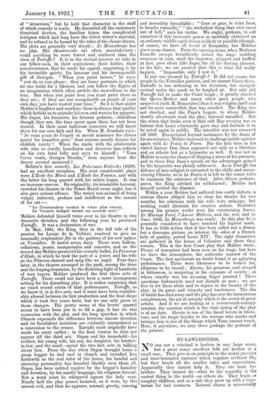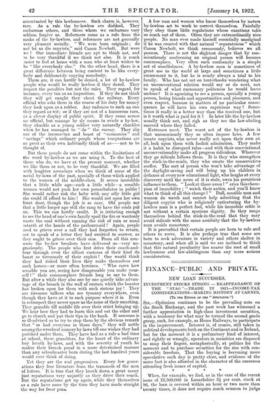BY-LAWLESSNESS.
NO one not a criminal is lawless in any large sense, but a great many excellent folk are lawless in a small way. They give in on principle to the moral precepts and time-honoured customs which regulate civilized life, but they break all the smaller rules and conventions. Apparently they cannot help it. They are born by- lawless. They cannot do—what to the majority is the easiest thing in the world—as others do. They begin as naughty children, and as a rule they grow up with a repu- tation for bad manners. Natural charm is occasionally accentuated by this lawlessness.. Such charm is, however, rare. As a rule the by-lawless ars dislike. They embarrass others, and those whom wo embarrass very seldom forgive us. Reformers come as a. rule from the ranks of the by-lawless, and reformers are not generally very pleasant socially. " We were born; originals ; do not Iet us die copyists," said Canon Newbolt. But were we ? Our immediate friends are apt to think not, and to be very thankful if we think not also. It is much easier to feel at. home with a man who at least wishes to be " like everybody else." On the other hand, there is a great difference between being content to be like every- body and deliberately copying somebody. There are, it can hardly be denied, a lot of by-lawless people who would be really lawless if they dared. They respect the penalties but not the rules. They regard, for instance, every tax as an imposition. If they do not think they will get caught they cheat the railway. Every official who asks them in the course of his duty for money they look upon as a robber. Any rudeness to such an one they regard as wit; or if they are not of a humorous turn, as a clever display of public spirit. If they come across no official, but manage by sly means to evade a by-law, they chuckle as a young soldier very naturally chuckles when he has managed to " do " the enemy. They slip out of the income-tax and boast of " economies ' and "savings" which ordinary people whose temptations are as great as their own habitually think of as—not to be thought of.
But these people do not come within the limitations of the word by-lawless as we are using it. To the best of those who do, we have at the present moment, whether we like them or not, to be very thankful. We are filled with laughter nowadays when we think of some of the social by-laws of the past, specially of those which applied to the women of the middle-class. It seems incredible that a little while ago—such a little while—a sensible woman would not push her own perambulator in public I She would rather risk the baby with any silly little girl she could ill afford to hire ! She would not open her own front door, though the job is so easy. Old people say that a little• longer ago still she rang to have the coals put on. This we can hardly credit. It is irritating enough to see the head of one's own family spoil'the fire or wantonly waste the coal without running the risk of ruin or nasal catarrh at the hands of the parlourmaid ! Again, people used to grieve over a call they had forgotten to return, not to speak of a letter they had omitted to answer, as they ought to grieve over their sins. From all this non- sense the by-law breakers have delivered us—very un- graciously. The people who first drive their coach-and- four through even the silliest customs of their kind do boast so tiresomely of their exploit I. One would think they had risked their lives they make themselves out such heroes—or more often heroines. " Who cares how sensible you are, seeing how disagreeable you make your- self ? " their commonplace friends long to say to them. But after a while they also one by one quietly take advan- tage of the breach in the wall of custom which the boaster has broken open for them with such riotous joy ! They are tiresome talkers who see tyranny everywhere, even though they have at it to such purpose where it is. Even in retrospect they never spare us the noise of their smashing. They grumble till middle life over their strict bringing up. We hear how they had to learn this and eat the other and go to church and put their tips in the bank. If someone is so ill-advised as to try to stop them by the obvious remark that " so had everyone in those days," they will rattle among the wrecks of nursery by-laws till one wishes they had perished under them. They have had as a rule a bad time at school, these grumblers, for the heart of the ordinary boy loveth by-laws, and with the severity of youth he makes their breach penal in a more determined manner than any schoolmaster born during the last hundred years would ever think of doing.
Yet they are the real progressives. Every few gener- ations they free literature from the trammels of the men of letters. It is true that they knock down a great many just reputations very unjustly as they drive their- coach. But the reputations get up again, while they themselves as a rule have none by the time they have made straight the way for freer pens. A few man and women who know' themselves by nature- by-lawless set to work to correct. themselves. Painfully !they obey, those little regulations whose exactions take, so much out of them. Often they are extraordinarily nice, people. No man ever made himself essentially unong,inal 'if he was created with• that natural " separateness." which Canon Newbolt, we think erroneously, believes we all possess. There is not the slightest danger that by con- scientiously conforming an original person will, become. commonplace. Very often such conformity is a simple act of unselfishness. A by-lawless man is sometimes of. great use to the world at large and sometimes a. little amusement to it, but he is nearly always. a trial to his. family. Who has not sat on tenterhooks wondering what an unconventional relation would say or do next, not, to speak of what customary politeness he would leave undone ? It is agonizing to see a person, specially a young person, losing friends and opportunities and, pleasures, and even respect, because in matters of no particular conse- quence he will have his own capricious way I Some- times it really is a better way than the received one, but. is it worth what is paid for it ? In later life the by-lawless usually think not, and sigh as they see the law-abiding succeed where they failed. Extremes meet. The worst act of the by-lawless in that unconsciously they so often impose laws. A few, innate copyists, who never really act upon their own at, all, look upon them with foolish admiration. They make it a habit to disregard rules—and with their conventional unconventionality make all progress ridiculous. Wherever they go ridicule follows them. It is they who strengthen the stick-in-the-muds, they who create the conservative scoffer. The sort of person who won't take advantage of the daylight-saving and will bring up his children in defiance of every new educational light, who laughs at every discovery until the news of it is stale, owes his pernicious influence to them. " Look at those asses l'" cries this cham- pion of immobility ; " watch their antics, and you'll know what to think of all this change-! " Dull, sensible men and women do watch and cannot help admitting that the diligent copyist who is religiously caricaturing the by- lawless man is a perfect fool, while his immobile critic is not without a certain specious dignity. So they range themselves behind the stick-in-the-mud that they may avoid ridicule with the same assiduity that the by-lawless man avoids monotony. It is proverbial that certain people are born to rule, and others to serve. It is also perhaps true that some are born to seek adventure in variety and others shelter in monotony,-and when all is said we are inclined to think that this natural peculiarity lies nearer the root of small lawlessness and law-abidingness than any more serious consideration.



































 Previous page
Previous page